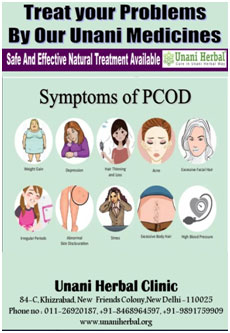
PCOD
Polycystic ovary syndrome (PCOd) is a condition that affects a womanís hormone levels. Women with PCOd produce higher-than-normal amounts of male hormones. This hormone imbalance causes them to skip menstrual periods and makes it harder for them to get pregnant. PCOD symptoms consist of irregular or no menstrual periods, severe menstrual periods, unwanted facial hair, acne, pelvic ache, trouble having a baby, darker, velvety skin. Related ailments consist of type 2 diabetic issues, morbid obesity, obstructive sleep apnea, heart problems, depression issues, and also endometrial cancer.
PCOD is regarded as the typical endocrine problem among ladies between the age groups of 18 and 44. It can affect around 2% to 20% and this age group based on how it is defined

PCOD Sign And Symptoms
- Acne
- Darkening of skin
- Hirsutism (abnormal growth of hair on face and body)
- Irregular menstrual cycle
- Skin tags
- Thinning hair
- Weight gain

Some of the possible complications of PCOD are:
- Abnormal uterine bleeding
- Psychological disorders like depression and eating disorders
- Endometrial cancer
- Pregnancy induced or Gestational diabetes and/ hypertension
- Infertility
- Metabolic syndrome
- Miscarriage or premature birth
- Sleep apnoea
- Some lifestyle modifications that can help in reducing the effects of PCOd include:
- Diet management and limitation in consumption of carbohydrates
- High-carbohydrate and low-fat diets.

Causes
Polycystic ovary disorder (PCOD) is a hormonal disorder in women, which can affect the functioning of a womanís ovaries. However, the cause of PCOD is unknown. But the common causes may include family history, insulin resistance, inflammation, lifestyle.
Family HistoryThere is a 50% possibility of getting PCOD among the women whose immediate female relatives do suffer from PCOD. As you grow older, this PCOD may lead to Type 2 diabetes which considered being common among the women with PCOD.
Insulin resistance & LifestyleWomen with PCOD have insulin resistance, Up to 70%. Which means that their cells canít use insulin properly. The pancreas produces Insulin, which is a hormone to help the body use sugar from foods for energy. In insulin resistance, cells canít use insulin properly and the bodyís demand for insulin increases. To compensate, the pancreas makes more insulin.
Factors of Insulin Resistance
- Insulin resistance as a result of genetic factors
- Insulin resistance as a result of being overweight (related to diet and inactivity)
- A combination of both of these factors
- Inflammation
Sometimes, a higher weight may worsen insulin resistance and the symptoms of the polycystic ovarian syndrome. Some women with PCOD report that they had never experienced symptoms such as menstrual irregularity or excessive hair growth and are a healthy weight. However, these symptoms only appear once they gain weight.
PCOD and Your Diet: The Do's and Don'ts
- 1. Include more of fruits and vegetables in your diet and avoid dairy-based products.
- 2. Include lean meat like fish and avoid red meat.
- 3. Avoid saturated or hydrogenated fats.
- 4. PCOD patients might experience water retention and the best way to beat that would be to eat small frequent meals and a lot of water through the day.
- 5. There are some natural herbs you can take to help keep your hormones in control, such as meethi dana, flaxseeds and cinnamon.
- 6. PCOD patients should avoid trans fats, high sodium and fatty food. They should have a diabetic diet and work towards losing weight.

Consult to the best unani experts for all your problems.
Call-8468964597
Nomination form for 2017 Global Awards :
http://www.unaniherbal.org/nomination-form.html
For more information you can also follow us on:

 If you wish to cancel your subscription to this newsletter click here
Copyright 2014 Unani Herbal
If you wish to cancel your subscription to this newsletter click here
Copyright 2014 Unani Herbal

